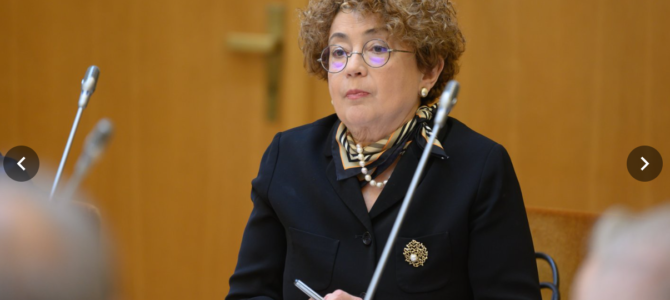by Birutė Vyšniauskaitė, lrytas.lt
Jews in Lithuania: a still undiscovered or an already-lost shared history? Human rights, modern anti-Semitism. Recording Lithuanian Jewish culture for posterity. These and many other topics touching on Lithuanian Jewish culture, the Holocaust and culture were discussed the current Fifth World Litvak Congress.
The Congress was supposed to have been held two years ago on the 300th anniversary of the birth of Eliyahu ben Solomon Zalman, the Vilna Gaon, the renowned rabbi, kabbalist and student of the Torah and Talmud. …
[I asked] Faina Kukliansky, the chairwoman of the Lithuanian Jewish Community who was born and grew up in Lithuania, what it means to be a Litvak.
“My dad used to say his grandchildren were born in Lithuania and therefore bore the seal of quality, and were fit for export,” Kukliansky joked.
She said Litvaks are Jews from the land of Lithuania: “We drink water here, we make food from what this land provides. We are inhabitants of this country. The exceptional thing about Litvaks, however, in all fields and many matters, is obvious: our language is the most beautiful and nobody, not even in Israel, speaks Hebrew so well as was taught at the Šiauliai Jewish Gymnasium, where my mother was graduated. We are the cleverest and the greatest intellects in the Jewish world. Furthermore, Lithuania and Litvaks have provided so many famous politicians and public figures to Israel! I always say the post of president of Israel belongs to us Litvaks. Just by virtue of Litvak president Shimon Peres! Benjamin Netanyahu who held the post of prime minister four times has ancestors from Lithuania as well. My uncle Dov Shilansky, born in Šiauliai, was speaker of the Israeli Knesset from 1988 to 1992. The list goes on and on.”
Recalling her family–all Litvaks–, Faina Kukliansky told the interesting story about how her mother’s family, who came from Šiauliai, didn’t consider her father, who was born in Veisėjai, a real Jew.
“He didn’t speak Hebrew as correctly as my mother did,” she remembered.
“There was also a conflict in the family because of potato pancakes. The first to complain was my late husband of beloved memory, Alfonsas Pilitauskas, because he as a Žemaitijan was used to eating potato pancakes with cheese and sour cream. My mother in Šiauliai ate potato pancakes with sour cream and sugar. My father liked to eat them in yet another way; Jews in Veisėjai always put blueberry jam on their potato pancakes. Because of all these disagreements at the table I categorically refused to make potato pancakes,” LJC chairwoman Faina Kukliansky commented on her family life.
Full article in Lithuanian here.


